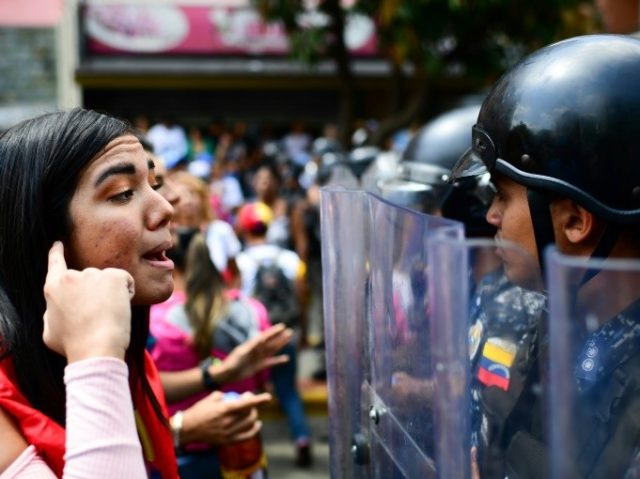The regime of dictator Nicolás Maduro in Venezuela is still holding 397 political prisoners as of this Monday, a slight drop following an alleged “humanitarian” release of prisoners that also reportedly included common criminals.
The statistic does not include individuals temporarily detained and beaten or tortured in custody, then released. It may indicate an increase in the use of that tactic – common under Raúl Castro in Cuba, whose government controls the Maduro regime – and a decline in the number of protest actions since President Juan Guaidó failed to dislodge Maduro from power in April.
Maduro has not been legitimately president of Venezuela since January, when his last term expired. He claims the presidency as a result of “winning” an “election” in May 2018 with record low turnout against only other socialist candidates, as he banned authentic opposition candidates from running. Most of Latin America and much of the free world did not accept the election as legitimate and considers Guaidó – appointed through the emergency constitutional process that takes effect when a president refuses to vacate power – the president. The military, however, has refused to answer to Guaidó and continues to repress the Venezuelan people on Maduro’s behalf.
The Venezuelan Penal Forum, a non-governmental organization that tracks police brutality and repression in the country, published the new political prisoner numbers on Monday. According to the NGO, the overwhelming number of those imprisoned for their beliefs are men – 376, compared to 21 women – and civilians, of which 280 are documented. Maduro also released all known minors under custody.
Balance de #PresosPoliticos en Venezuela al 25/11/2019 por Foro Penal:
Total presos políticos: 397
Hombres: 376
Mujeres: 21Civiles: 280
Militares: 117Adultos: 397
Adolescentes: 0#QueSeHagaJusticia #DDHH #Infografia #Balance #Libertad #25N @Almagro_OEA2015 @ONU_derechos pic.twitter.com/svxo5spobA— Foro Penal (@ForoPenal) November 26, 2019
It is possible that unknown soldiers are being held in secret prisons, as Maduro has relied on martial law to repress dissidents regularly in the past. He also hinted at potentially dozens of arrests last week of soldiers who the regime accused of conspiring with the United States and Colombia to remove him from power.
“In the last few months … we have dismembered, with the proper participation of officials from our armed forces, over 47 attempts to kidnap officers to put them at the service of the strategy of Colombia and the gringos,” Maduro said. “There are people in prison for that, some ceded and were bought and simply were uncovered or intercepted by information from patriotic officials.”
Maduro did not offer a number of suspects or a date when they were arrested, so there is no way of verifying their detention is public.
The Organization of American States (OAS) confirmed that it had received a copy of the list of prisoners and verified that all are, indeed, political prisoners.
Maduro and his regime have denied taking prisoner Venezuelans who disagree with his socialist policies. His most high-profile denial occurred in an interview that he confiscated from Univisión journalist Jorge Ramos – but Ramos later retrieved using anonymous sources in the country – in which Ramos asked him to explain why he denied holding political prisoners and presented the dictator with a list of the people behind bars for their ideology in the country. Maduro tossed the list aside and, enraged, ordered the arrest of Ramos and the Univisión team.
Venezuela has, under both Maduro and predecessor Hugo Chávez, routinely imprisoned dissidents. The head of the Venezuelan Penal Forum, Gonzalo Himiob, warned in June that the policy of imprisoning dissidents had since expanded to the families of those who vocally defy the regime, a widely recognized but common human rights violation in socialist and communist countries.
The number of political prisoners has fallen, by Penal Forum estimates, from 477 in September – the product of a deal that Maduro brokered to save face with the international community that month. The deal, allegedly brokered with elements of the “opposition” but not with anyone involved in Guaidó’s government, Maduro attempted to see as a gesture of goodwill, but the NGO accused Caracas of sneaking common criminals into the “political prisoner” deal – thus avoiding the release of dissidents who could best challenge the regime and indebting common criminals to the regime. Maduro has for years use colectivos, socialist criminal gangs, to assault and intimidate dissidents.
“If they free, let’s say, 40 people, that would represent ten percent, less than ten percent, of the 477 political prisoners still behind bars. So the first problem is that a group of political prisoners under the same unjust and political circumstances of arrest will be left forgotten, trapped,” Alfredo Romero, the director of the forum, said at the time. He added that the regime “regularly includes in its group of freed suspected political prisoners some who are not [political prisoners], but common criminals.”
At least one of those released was a political prisoner, however: Edgar Zambrano, Guaidó’s deputy in the National Assembly, who secret police towed into prison in his car in May as retribution for Guaidó attempting unsuccessfully to take over the military.
OAS chief Luis Almagro testified last month to the brutal torture and abuse the Venezuelan regime uses against dissidents.
“Sometimes, they are brought into a court only to display that they have been savagely tortured and so that they die a few hours later,” Almagro said.
Liberated political prisoners have testified to crucifixion, electrocution, sleep deprivation, and a host of other torture mechanisms commonly used in Venezuelan prisons.
Venezuela will return to the United Nations Human Rights Council in 2020.
Follow Frances Martel on Facebook and Twitter.

COMMENTS
Please let us know if you're having issues with commenting.